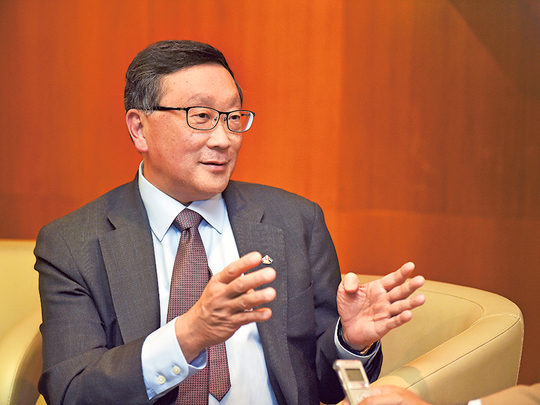
Dubai; BlackBerry thinks this fiscal year will be the years its handsets returns to profitability, executive chairman and CEO John Chen told Gulf News on Tuesday.
In September 2015, he said his goal was to make the company break even within a year by selling 5 million handsets for the year; however, the company only sold 3.2 million units.
Chen still maintains it will only take one year to turn the company around, but after cutting costs, he says the company can be profitable in 2016 by only selling 3 million devices.
He said the latest fourth-quarter results were “solid” as the company has made progress on the key elements of its strategy, which are to grow its software faster than its mobile operating system, achieve profitability on its handsets, and generate positive cash flow.
“We will seriously consider moving to the software business only if hardware sales does not pick up,” he said.
The Canadian company expects a 30 per cent growth in software and services business this year, due to investment the company made in the internet of Things (IoT) sector.
Chen said that since coming to Blackberry two-and-a-half years ago, the first thing the team did was to repair the balanced sheet, generate cash [we have done that in last eight quarters in a row], and implement a good strategy on security, enterprise, handset, and IoT.
In the last 12 months, BlackBerry spent more than $1 billion to acquire six companies, including Good Technology, WatchDox, Encription and AtHoc, to drive the cross-platform software and IoT strategy.
“We have good cash in hand right now, and we have a strategy and will invest in that strategy. Our intention is to do one thing at a time but to do it correctly,” he said.
This year, he said that BlackBerry will see some growth and the only way to grow is to create more presence in the market.
“Part of me being here is to focus on expanding our market presence. This is my first stop, so it shows how important this region is, and next [he will be going] to India. We have ambitious plans but we will not be doing everything at the same time. You will we see us being aggressive in distribution this year,” he said.
He said that he has met with telco operators in the UAE, and they said they said they would love for the enterprise segment to use BlackBerry phones, so “we will work with them”.
“This year, I will be pushing two Android devices and the Passport [BB10] with the telco operators,” he said.
The company’s first Android device — Priv — launched in November 2015 with premium build quality, physical keyboard, large screen, and enterprise-friendly apps. It was priced at Dh2,899.
“Priv is highly priced, but this year we will launch a mid-range device,” he said.
When asked if the next model would be Vienna, he just laughed and said “you know it?” He did not say when the new device would be released.
On whether two devices are enough to compete in the market, he said that it is enough to break even in the handset business. Then, he said, once you get the foundation solid [technology and financial], then you can do more.
Priv is present in 34 countries and 80 telecom operators. Chen said that the company still has work to do in expanding across the globe.
He made it clear that if the trend of dwindling smartphone sales continues, the company will shut down the division and focus entirely on security and enterprise.











